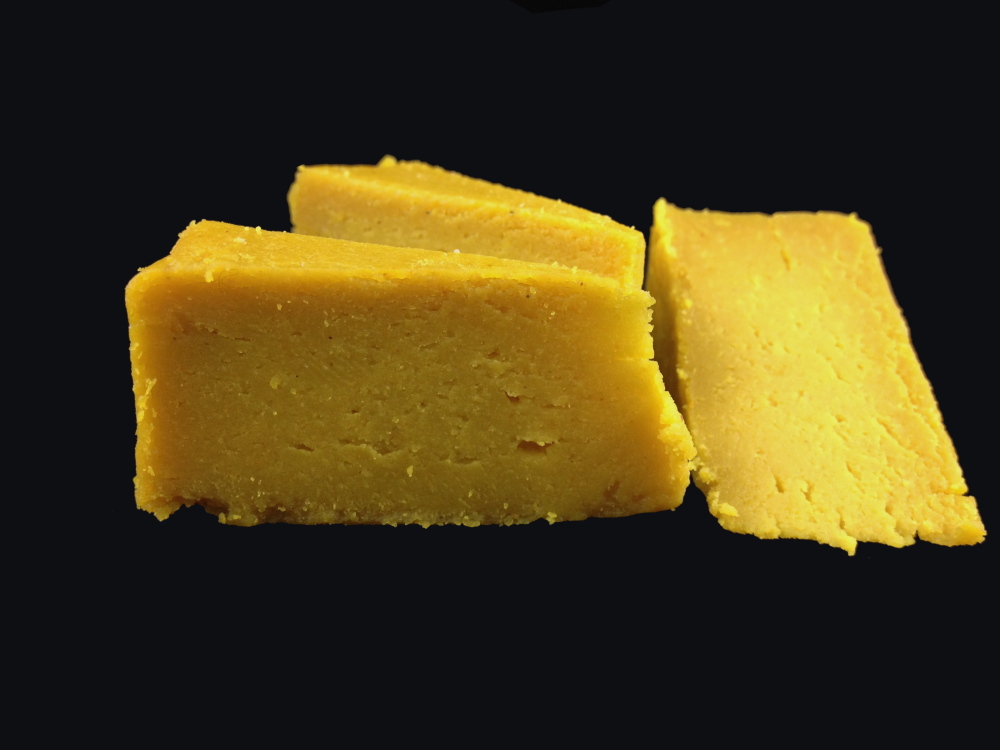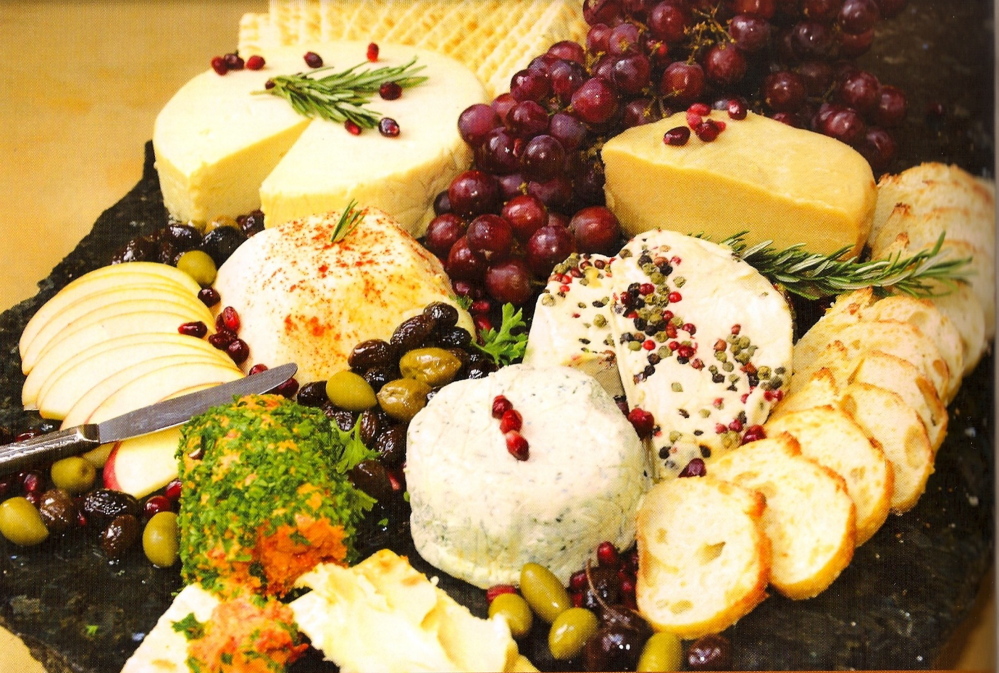Wendy Andresen of Camden describes cheese this way: “There’s something so satisfying about it – the salt and the fat.”
Cheddar, pepper jack, mozzarella and brie are among her favorites. However, two years ago the longtime vegetarian decided to start eating a vegan diet. She said the transition was easy, except for one thing:
“I really missed cheese.”
So this past fall Andresen, 73, bought a copy of “The Non-Dairy Evolution Cookbook” by Skye Michael Conroy and began working her way through the recipes. The book includes sections on cultured nut-based cheeses, block and wheel cheeses and tofu-based cheeses. Like traditional dairy-based cheeses, this style of vegan cheese relies on the fermentation action of live bacteria in the form of a starter culture.
Andresen has served her homemade vegan cheeses at many parties, including a cheese-tasting party where, “in addition to the cheese board, I made a little sample menu of Greek salad with feta; a puff pastry log with spinach, scallions, pine nuts and sliced brie wrapped in pastry; and brandied cherries with mascarpone,” she said.
Most people assume they are eating dairy-based cheeses, she said, adding that even a friend who is a chef couldn’t believe they were vegan.
CASHEW CHEESE MAKER
Chris Roberts, chef and owner of The Juice Cellar in Bangor and Belfast, also missed cheese when he went vegan in 2012, so he began exploring the world of cultured vegan cheese. He had help from raw vegan celebrity chef and Maine native Matthew Kenney.
Kenney was Roberts’ original partner in the Belfast juice shop, although Roberts has since bought him out. Kenney, who is based in California, operates a number of plant-based restaurants, including The Gothic in Belfast. Plantlab Artisanal, a brand owned by Kenney, is experimenting with aged vegan cheeses. “I had people from his team who got me started making really amazing cashew cheeses in the summer of 2013,” Roberts said.
The cultured cashew cheeses he learned to make are considered the gold standard of vegan cheeses, but they’re also the most demanding to make. The first step involves creating a fermentation starter called rejuvelac. The process takes up to six days, including time spent sprouting the whole grain and then allowing it to ferment. The starter is mixed with soaked, pureed cashews and seasonings.
Once the cheese is made, it needs to age for anywhere from a few days to a few months.
“I made an incredible cheddar that fooled the deli manager at the Belfast Co-op,” Roberts, 34, said. “I aged it for 30 days. The cheese was absolutely sliceable and it was absolutely grateable, and I added no stabilizers, such as agar or kappa carrageenan.”
Both ingredients are often added to cultured vegan cheeses meant to age for a day or two.
Roberts sells two house-made cultured vegan cheeses in his stores – a sun-dried tomato and roasted herb cheese and a Boursin-style cheese. Both are soft, spreadable cheeses, which require much less time and space to produce. Each uses a non-dairy yogurt starter as the culturing agent.
“My goal is to make cheese that really activates all the salivary glands in your mouth,” Roberts said.
Andresen said while the slow-aged cheeses are truly delicious, she prefers making the ones that take less time.
The block and wheel cheeses, made using plain, unsweetened soy milk or homemade almond milk, take about 20 minutes to make, Andresen said, then another 6 hours to chill and firm up. Common ingredients include miso, nutritional yeast and lactic acid. Andresen warns they do take some muscle to whisk the ingredients together until they emulsify and then the mixture coagulates.
“You really have to get your shoulder into it,” Andresen said. “This is what I go to the gym for, so I can stir my cheese.”
RISE OF VEGAN CHEESE
Five years ago, if you wanted cultured vegan cheese you basically had no choice but to make it yourself. However, the last few years have witnessed a rapid rise in aged and artisanal vegan cheeses for sale in grocery stores and health food shops.
A couple of years ago, I wrote about Portland resident Betsy Nelson, who was launching a business selling aged nut-milk cheese. A year later she told me she’d shelved the project due to the growing competition and the complicated health code requirements. Today some of the national brands of cultured vegan cheese on the market include Kite Hill, Treeline, Nuttin Ordinary, Miyoko’s Kitchen, Punk Rawk Labs, Heidi Ho and Dr. Cow.
At Whole Foods Market in Portland, these cheeses range in price from $7 to $11. The Juice Cellar cheeses each cost $6 for an 8-ounce tub, and Roberts can’t meet the demand in his own stores, let alone supply other interested retailers.
According to National Public Radio, this new segment of the cheese market satisfies demand beyond the vegan market. In April, NPR reported, “as lactose intolerance and environmental and animal welfare concerns about livestock production drive more interest in alternatives to animal products, a new generation of nondairy-cheese makers is doing something novel: They’re actually making cheese.”
Because they are cultured and use fewer ingredients, these new vegan cheeses differ from the processed vegan cheese-like products that have been sold in grocery stores for more than a decade.
One person who knows vegan cheese making both at home and on a commercial scale is Miyoko Schinner, a San Francisco resident and the author of “Artisan Vegan Cheese: From Everyday to Gourmet.” She is also the founder of Miyoko’s Kitchen, which began selling cultured vegan cheeses last year, and a star in the Maine-produced cooking show “Vegan Mashup,” which airs on PBS.
“One of the reasons I started the cheese company,” Schinner told me when I reached her by phone, “is because I was constantly getting feedback from readers who said, ‘I love your cheese and your book, but it’s such a hassle to make at home. Can you just make it and sell it?’ ”
Some of the company’s cheeses are aged for up to two months, Schinner said.
Those attempting to make vegan cheese at home need to realize it is a craft that can be honed with practice, she said. Your first batch of homemade cheese likely won’t be your best, she said. And, most importantly, it’s not a pursuit for those seeking instant gratification.
“The primary ingredient in my cheeses is patience,” Schinner said. “If you want to have a really good, fully developed cheese, you have to let nature do its thing.”
Avery Yale Kamila is a freelance food writer who lives in Portland. She can be reached at:
avery.kamila@gmail.com
Twitter: AveryYaleKamila
Send questions/comments to the editors.



